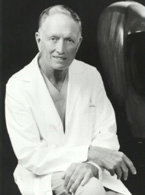A Quote by Toni Braxton
I had a 23 per cent blockage in my micro-arteries. At first the doctors thought I needed a heart transplant, then they said I have microvascular angina, which means I will be on medication for the rest of my life.
Related Quotes
If you walk along the street you will encounter a number of scientific problems. Of these, about 80 per cent are insoluble, while 19½ per cent are trivial. There is then perhaps half a per cent where skill, persistence, courage, creativity and originality can make a difference. It is always the task of the academic to swim in that half a per cent, asking the questions through which some progress can be made.
I just had a son and had to take him to the paediatrician and he measured his head and apparently he's in a group in which only 14 per cent of the population have a bigger head than him. Then she said: "Do you mind if I measure your head?" I said: "Go ahead." And she was shocked, because less than one per cent of the world's population has a bigger head than mine. So I guess that means I'm pretty full of myself. Or that I have a huge brain.
Here's the truth. The proposed top rate of income tax is not 50 per cent. It is 50 per cent plus 1.5 per cent national insurance paid by employees plus 13.3 per cent paid by employers. That's not 50 per cent. Two years from now, Britain will have the highest tax rate on earned income of any developed country.
If college cut-offs are above 90 per cent in a particular class, then where would mediocre students with 60 per cent or 70 per cent go? Students who secure 60-70 per cent marks are also intelligent, but they could not get admission in courses of their choice for scoring lower marks than the toppers.
When we started, I was delivering meals to people in Atlanta. We were a direct-care organization. And it was - people needed meals, they needed transport, they needed medication, they needed buddy systems. They had a death sentence. There was AZT, and that was just prolonging the agony, basically. Now people, of course, if they are on antiretrovirals, they face a lifetime of health, basically. I mean, it doesn't - it's I would say in the 99 percent certainty bracket that if you are on that medication, you will have a healthy life.
Of the many 'firsts' with which I have been involved at the Texas Heart Institute —including the first successful human heart transplant in the United States and the first total artificial heart transplant in the world—the achievement that may have the greatest impact on health care did not occur in the operating room or in the research laboratory. It happened on a piece of paper... when we created the first-ever packaged pricing plan for cardiovascular surgical procedures.



































